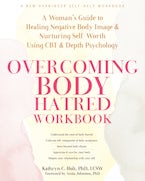By Kathryn C. Holt, PhD, LCSW, author of Overcoming Body Hatred Workbook
A guiding myth that I like to use during the first steps of recovery from body hatred is the ancient Greek myth of Psyche and Eros. In the myth, mortal Psyche is so beautiful that people start worshipping her instead of the goddess of beauty, Aphrodite. Aphrodite becomes jealous and commands her son Eros, the god of love, to make Psyche fall in love with the worst creature he can find. However, Eros accidently pierces himself with his arrow containing the potion that incites love, and he himself falls in love with Psyche and makes her his wife in secret. But Eros insists that Psyche can never look upon him in the light. When Psyche breaks this rule, Eros leaves her. Psyche seeks the help of Aphrodite to find him again. The goddess gives her four tasks, with the first one being the sorting of a pile of mixed seeds by daybreak— poppy, millet, lentils and more. This seems impossible, but tiny, humble ants come to Psyche’s aid and by morning, the seeds are separated. Each subsequent task Psyche is given is just as impossible, yet Psyche is helped by forces beyond her control to complete each one. In the end, Aphrodite keeps her word, Psyche is reunited with her love, and they are married. Psyche represents the human soul that is learning how to be in relation to larger, transpersonal forces, including love, beauty, and the divine. Her first task is the modest task of inner organization and discernment: the psychological work of separating our internal worlds, examining our thoughts, feelings, beliefs, and human life experiences. It’s also what happens in psychotherapy—we sort through in order to understand and make the unconscious conscious by paying careful attention to our inner experiences, particularly the more troublesome parts. The operative word here is careful—we care for our inner worlds, paying attention to the seeds we are sorting by shedding light on thoughts and feelings that we might wish we could simply ignore, but that have been waiting for attention. The gift of learning how to sort our inner psychological material is one that we carry forward through the rest of the journey, just as Psyche continues her journey towards Eros, the unification of human soul and divine love, we must sort through the jumble of conditioning and feelings we have internalized about our bodies. This is humbling work that helps us to see ourselves clearly from a grounded place. We need to discern which thoughts about our bodies are true and which ones are not; which thoughts and beliefs harm us and which ones support our becoming. Recovery from body hatred entails skills of mind and emotion, learning how to:
• Distinguish thoughts of body hatred from your true emotions; sort out what you think about your body from what you are feeling.
• Identify what you are feeling and understand how to respond compassionately and effectively to what you are feeling. Identify what the signals of emotion are saying to you by activating the inner “ants” carefully, paying attention to the particular feelings you experience as instincts guiding you towards a need, a longing, or something to express.
• Externalize what you have internalized, which means seeing how body hatred is largely influenced by outside forces (family, culture, media), so you can consistently put these influences back in their place, in the pile labeled “Cultural Conditioning that Made Me Hate My Body.”
Kathryn C. Holt, PhD, LCSW, is a depth psychotherapist in private practice in Boulder, CO. She writes about bodies, motherhood, spirituality, and healing while bridging the fields of Jungian and behavioral psychology. Holt is coauthor of The Stronger Than BPD Journal.



 Part 2: What to Do When a Client Is Participating in Self-Judgment?
Part 2: What to Do When a Client Is Participating in Self-Judgment?